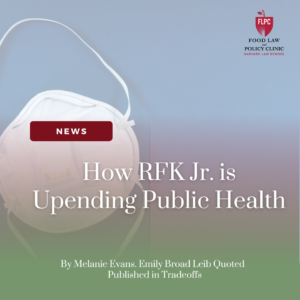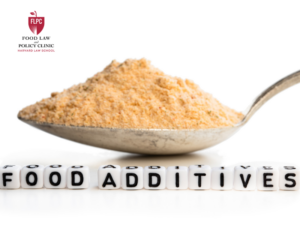This blog post was written by Sophie DeBode, a student in the Food Law and Policy Clinic
On January 5, 2023 President Biden signed into law the Food Donation Improvement Act (FDIA)—legislation that will reduce both food waste and food insecurity. The bipartisan Bill passed in the Senate by unanimous consent and in the House by voice vote at the end of December.
The FDIA was introduced in the Senate (by Senators Blumenthal, D-CT and Toomey, R-PA) and the House (by Reps. McGovern, D-MA; Newhouse, R-WA; Pingree, D-ME; and Walorski, R-IN), along with many other cosponsors, with the goal of expanding food donation efforts across the country. The Food Law and Policy Clinic supported members of Congress and their staff throughout the drafting and legislative process and are thrilled to see this important piece of legislation become law.
This bill builds on the Bill Emerson Good Samaritan Food Donation Act (passed in 1996) which encourages companies to donate surplus food to nonprofits by providing civil and criminal liability protection both to food donors and nonprofit intermediaries. The FDIA will enhance the coverage of the Emerson Act by expanding liability protection in two ways that will support modern food donation.
First, the FDIA will extend liability protection to donations offered to recipients at a good Samaritan reduced price—a price that is not greater than the cost of handling, administering, harvesting, processing, packaging, transporting, and distributing the food. Currently, the Emerson Act only protects food donations if the final recipient receives the food for free. However, some nonprofits, such as social supermarkets, which sell food at a greatly reduced rate, can fill a need for food insecure individuals who may be unwilling or unable to qualify for government assistance or use a traditional food panty or soup kitchen. By extending liability protection for donations to these nonprofits, the FDIA will allow for innovation in food distribution models to ensure broader access to food and increased food rescue. This change will make food donation and recovery more sustainable in the long term as it allows organizations to work with more partners to collect surplus food if they can cover the costs.
Second, the FDIA will extend protections to certain donations given by food businesses, those which are already required to comply with food safety requirements, directly to those in need. Currently the law only protects food donors who donate food to a nonprofit organization which distributes the food to food insecure individuals. By also protecting direct donations to those in need, the FDIA will increase efficiency, reduce costs, and enable consumption of perishable food. Food insecure individuals will now be able to pick up food right from the source, such as local restaurants, grocery stores, and schools.
By strengthening the Emerson Act, the FDIA can help increase wholesome food donations and major reductions in food waste. In the U.S., approximately 63 million tons of food are wasted each year (40% of food produced) and yet roughly 34 million people in the US live in food insecure households. Although much of this excess food is healthy and safe to eat, a significant amount ends up going to disposal instead of being consumed. Food donation provides a critical link between businesses with surplus food and individuals facing food insecurity, and by strengthening and expanding the Emerson Act, the FDIA will concurrently promote food donation and reduce food waste.


